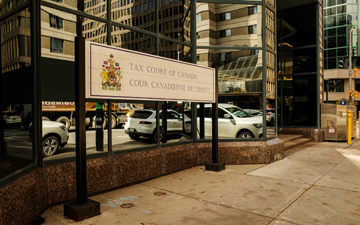When a tax-free savings account is a business & stripped of tax benefits

David J Rotfleisch comments on a recent Tax Court of Canada case
 |
David J Rotfleisch, CPA, JD is the founding tax lawyer of Taxpage.com and Rotfleisch & Samulovitch P.C., a Toronto-based boutique tax law corporate law firm. |
IN 2009, the Tax-Free Savings Account ("TFSA") program was introduced by the federal government of Canada as a means to allow Canadian families and individuals to more responsibly plan for retirement or significant life purchases. As of 2009, Canadian tax residents over 18 years old have been entitled to establish a TFSA with a registered issuer in Canada. Unlike other registered savings plans like a Registered Retirement Savings Plan ("RRSP"), a contributor to a TFSA is not entitled to deduct those contributions against income in that same year. Instead, per Canada's TFSA rules, any income earned within a TFSA will be earned on a tax-free basis, and any withdrawals made from a TFSA by its holder will also be received tax-free. As a result, a TFSA holder does not pay any tax on interest, dividends, capital gains or other income that accumulates within a TFSA.
A TFSA is often set up as an arrangement in trust with a registered issuer, such as a financial institution or credit union. In such cases, additional restrictions apply on how that TFSA may be managed, what contributions can be made to the account, and in particular when the income earned in that TFSA may become taxable. Specifically, under subsection 146.2(6) of the Canadian Income Tax Act, the income earned in a TFSA trust may be taxable where that TFSA trust carries on a business through its activities including trading activities. In the CRA's published views, certain activities like foreign currency trading, option writing and excessive stock trading are business activity which render the income from those sources taxable in the TFSA.
The recent Tax Court of Canada case, of Canadian Western Trust Company (as Trustee of the Fareed Ahamed TFSA) v. The King, 2023 TCC 17 ("Ahamed"), demonstrates the potential risks in how excessive trading activity may deprive a Canadian taxpayer of the tax benefits a TFSA can offer. The ruling in Ahamed is also important for Canadian taxpayers because it represents the first time the Tax Court of Canada has been asked to determine precisely when a TFSA "carries on a business" within the meaning of the phrase for Canadian tax law purposes.
While the experienced Canadian tax litigation lawyer for the taxpayer launched many creative and novel arguments concerning the legislative scheme for TFSAs and the policy purposes behind extending tax exemption to TFSA trusts, the Tax Court of Canada was unsympathetic to the taxpayer's argument. The Tax Court ultimately concluded the taxpayer had indeed carried on business activities through the TFSA on the traditional test, rendering that income taxable, and concluding that even on a generous reading of the law and its history the taxpayer's argument ought to fail.
The Rules Concerning Statutory Interpretation in Canada — A "Textual, Contextual and Purposive" Analysis
It is a reality that when governments draft laws, regardless of purpose or intent, it will be impossible to account for every exception to the rule. The court system plays a necessary and vital role in determining the meaning of ambiguous phrases and words in our laws, and in determining how those ambiguities should be resolved, when those words do not provide a clear solution for an individuals' circumstances.
The principles of statutory interpretation are fundamental and well-established in Canadian law. Canadian courts often invoke specific language when speaking about the process of statutory interpretation. As the Supreme Court of Canada articulated in its decision for Michel v Graydon, 2020 SCC 24, in order to determine the legislative intent of government the goal is to examine the statutory text in "its entire context and in its grammatical and ordinary sense, in harmony with the statute's scheme and objects."
The goal of the courts when engaging in statutory interpretation is not to inject particular policy objectives or preferences into the analysis of the law, or to play the role of policymakers and politicians. And especially in the context of Canadian tax law, the courts have emphasized that the text and context of a particular provision should be carefully scrutinized and heavily weighted relative to the broader legislative scheme involved. Given how intricate the Canadian tax system is, and how reliant on the particular language of the law Canadian taxpayers are when organizing their tax affairs, the courts have recognized that the precise words of tax statutes should be given full effect to ensure that taxpayers can act with an appropriate level of certainty.
The Facts of Ahamed
The Appellant taxpayer was a trust company engaged by a professional investor to establish a TFSA. The investor became beneficiary and holder of the TFSA in 2009, while the trust company acted as the trustee. The TFSA was established as a self-directed TFSA trust, and so the investor was responsible for making all purchases and sales of investments held under the TFSA. Nearly all the investments held under the TFSA were speculative penny stocks of nominal value, which were held for only short time periods. The investor capitalized the TFSA by making appropriate maximum contributions throughout 2009, 2010 and 2011. While the value of the investor's cumulative contributions in 2011 only equalled $15,000, the value of the TFSA was over $600,000, as a result of the purchases and sales made by the TFSA trust and directed by the investor.
The CRA reassessed the taxpayer for its 2009 through 2012 tax years on the basis it carried on a business of trading qualified investments in each year, and thus its income was subject to tax under subsection 146.2(6) of the Canadian Income Tax Act and could not be sheltered under the tax-exempt status of the CRA. The CRA applied the traditional test for finding that a taxpayer engaged in a business of trading securities, which is a fact-driven analysis considering the following:
- the frequency of the taxpayer's transactions;
- the period of ownership by the taxpayer for those securities;
- the taxpayer's knowledge of securities markets;
- whether the security transactions form part of the taxpayer's ordinary business;
- the time the taxpayer spends researching securities markets and potential purchases;
- the extent to which the taxpayer uses debt financing; (7) the taxpayer's advertising activities; and
- (if the securities are shares) whether they are speculative or dividend-paying.
The Taxpayer's Case Before the Tax Court of Canada
On appeal, the Canadian tax litigation lawyer for the taxpayer argued that the meaning of subsection 146.2(6) could not be clearly determined on a purposive reading of the provision, and that it could be reasonably argued that Parliament intended to extend the scope of the TFSA's tax exemption to TFSA trusts carrying on a business of trading qualified investments. The taxpayer's tax litigation counsel argued that the taxpayer then ought to benefit from the "residual presumption" principle (that is, where the ordinary principles of statutory interpretation do not yield a clear result, there must be a residual presumption in favour of the taxpayer), and a finding that the income from the trading of qualified investments was not taxable. The Canadian tax litigation lawyer for the taxpayer presented a comprehensive argument concerning the scheme of the Canadian Income Tax Act to support this position:
- A TFSA is a registered savings plan much like a Registered Retirement Savings Plan ("RRSP"). Under paragraph 146(4)(b) of the Canadian Income Tax Act, income earned by an RRSP from carrying on a business of trading qualified investments remained tax-exempt.
- The safeguards implemented by Parliament in the Canadian Income Tax Act concerning abuse of tax-exempt status are all aimed to prevent unfair competition between exempt entities like charities and non-profit organizations and taxable entities like for-profit businesses. Given that the after-tax consequences of contributing to a TFSA and an RRSP are identical, there would be no rational legislative purpose for barring a TFSA trust from carrying on a business of trading qualified investments while exempting an RRSP carrying on that business.
- The traditional test of determining whether a taxpayer has engaged in a business of trading securities on income account or capital account was not constructed with a view to non-taxable entities like a TFSA trust trading qualified investments. First, the traditional test fails to account for the unique advantages that drive a TFSA holder to invest in certain securities. More specifically, that TFSA holders are inherently encouraged to use a different investment strategy and engage in riskier and more speculative investments than when trading without an exemption. Second, the nature of TFSA investing makes a number of the traditional factors considered when determining whether a taxpayer engaged in securities transactions on income account (i.e. the extent to which debt financing is used, advertising) inapplicable. And ultimately, the remaining elements of the traditional test over-emphasize the knowledge of the TFSA holder, preventing professional investors benefiting from investing in a TFSA trust.
- The Tax Court of Canada in Prochuk v The Queen, 2014 TCC 17 ("Prochuk"), concluded that trading within an RRSP does not amount to carrying on a business of trading, and that while those comments by the court were made in the RRSP context, there is no rational basis for refusing to extend those conclusions to the TFSA context.
The Canadian tax litigation lawyer for the Canada Revenue Agency, naturally, held a different view. The CRA's Canadian tax counsel argued that when read in its entire context subsection 146.2(6) had a precise and unambiguous meaning, and that the taxpayer's interpretation of the provision amounted to a judicial re-writing of the law. To support this position, the CRA's tax counsel presented additional arguments:
- It is a principle of Canadian law that Parliament is presumed to know the legal context in which it legislates, including the common law. When section 146.2 of the Canadian Income Tax Act was passed in 2008, it was well-established a taxpayer could carry on a business by trading in securities, and that such a determination was always a question of fact. The taxpayer's interpretation would require creating a carve-out to protect a TFSA that carries on a business by trading qualified investments, which would create an unexpressed exception under the law, and usurp Parliament's role in governance.
- Parliament was free to adopt the same statutory approach toward TFSAs as it had for RRSPs, but deliberately chose not to extend the same tax exemption that RRSPs benefit from concerning business carried on involving qualified investments. This would make perfect sense given that unlike a TFSA where funds withdrawn are permanently exempt from tax, an RRSP only provides tax deferral benefits because any funds drawn from an RRSP are taxable as ordinary income. As such, if Parliament intended to exempt TFSA trusts from tax on trading involving qualified investments, the law would have been deliberately structured to reflect that, and that because it was not the taxpayer's argument necessarily failed.
- The court's comments in Prochuk could not support the taxpayer's position. In Prochuk the court had concluded that the trades in an RRSP are not relevant in deciding whether an individual is in the business of trading, rather than the RRSP trust itself. The Tax Court of Canada did not consider paragraph 146(4)(b) of the Canadian Income Tax Act which expressly contemplates an RRSP trust carrying on business trading in qualified investments when it issued its ruling. As a result, the Tax Court of Canada's failure to consider paragraph 146(4)(b) meant that the passing comments made in Prochuk were not binding precedent and did not have to be followed.
The Tax Court of Canada's Ruling
The Tax Court of Canada ultimately ruled in favour of the CRA, and found that the taxpayer had engaged in a business of trading qualified investments that vitiated the tax exemption benefits of the TFSA trust. The court followed the traditional process for judicial interpretation of a statute by engaging in a textual, contextual and purposive analysis of subsection 146.2(6):
- Text: The court emphasized the primacy of text in the context of Canadian tax law, and found the language of subsection 146.2(6) ("carries on one or more businesses.") was plainly broad enough to capture any sort of business, including a business of trading qualified investments.
- Context: The court found that the RRSP regime was a separate statutory scheme from the TFSA, given the apparent differences in how they are structured (i.e. requirements to contribute, how contributions are made, treatment of income earned in either type of registered account, taxation of withdrawals). As well, the language of subsection 146.2(6) incorporated by reference the judicial test for "carrying on business", simply by using that language with its well-established meaning under Canadian tax law.
- Purpose: The court found in the TFSA was designed to encourage Canadians to save and invest, and to limit the types of income that could accumulate tax-free by preventing taxpayers from carrying on a business while benefiting from the TFSA tax exemption.
Given that the taxpayer traded frequently, had a history of trading speculative securities, and his knowledge and experience, it was incontrovertible the TFSA trust carried on a business of trading qualified investments. On the clear text of subsection 146.2(6) of the Canadian Income Tax Act, any business carried on by a TFSA renders income from that source taxable. The taxpayer's purported exemption for trading qualified investments would ignore this clear language, and the court found it could not be accepted. The court concluded the comments made by the court in Prochuk were not binding, as they concerned a different statutory scheme, and that accepting them as precedent would constitute judicial rewriting of clear statutory language. As a consequence, the court dismissed the taxpayer's appeal and reaffirmed the CRA's tax assessments for business income.
David J Rotfleisch, CPA, JD is the founding tax lawyer of Taxpage.com and Rotfleisch & Samulovitch P.C., a Toronto-based boutique tax law corporate law firm and is a Certified Specialist in Taxation Law who has completed the CICA in-depth tax planning course. He appears regularly in print, radio and TV and blogs extensively.
With over 30 years of experience as both a lawyer and chartered professional accountant, he has helped start-up businesses, cryptocurrency traders, resident and non-resident business owners and corporations with their tax planning, with will and estate planning, voluntary disclosures and tax dispute resolution including tax audit representation and tax litigation. Visit www.Taxpage.com and email David at david@taxpage.com.
Read the original article on TaxLawCanada.com. Title image: iStock, Tax Court of Canada, Ottawa. Author photo courtesy Rotfleisch & Samulovitch P.C.









(0) Comments